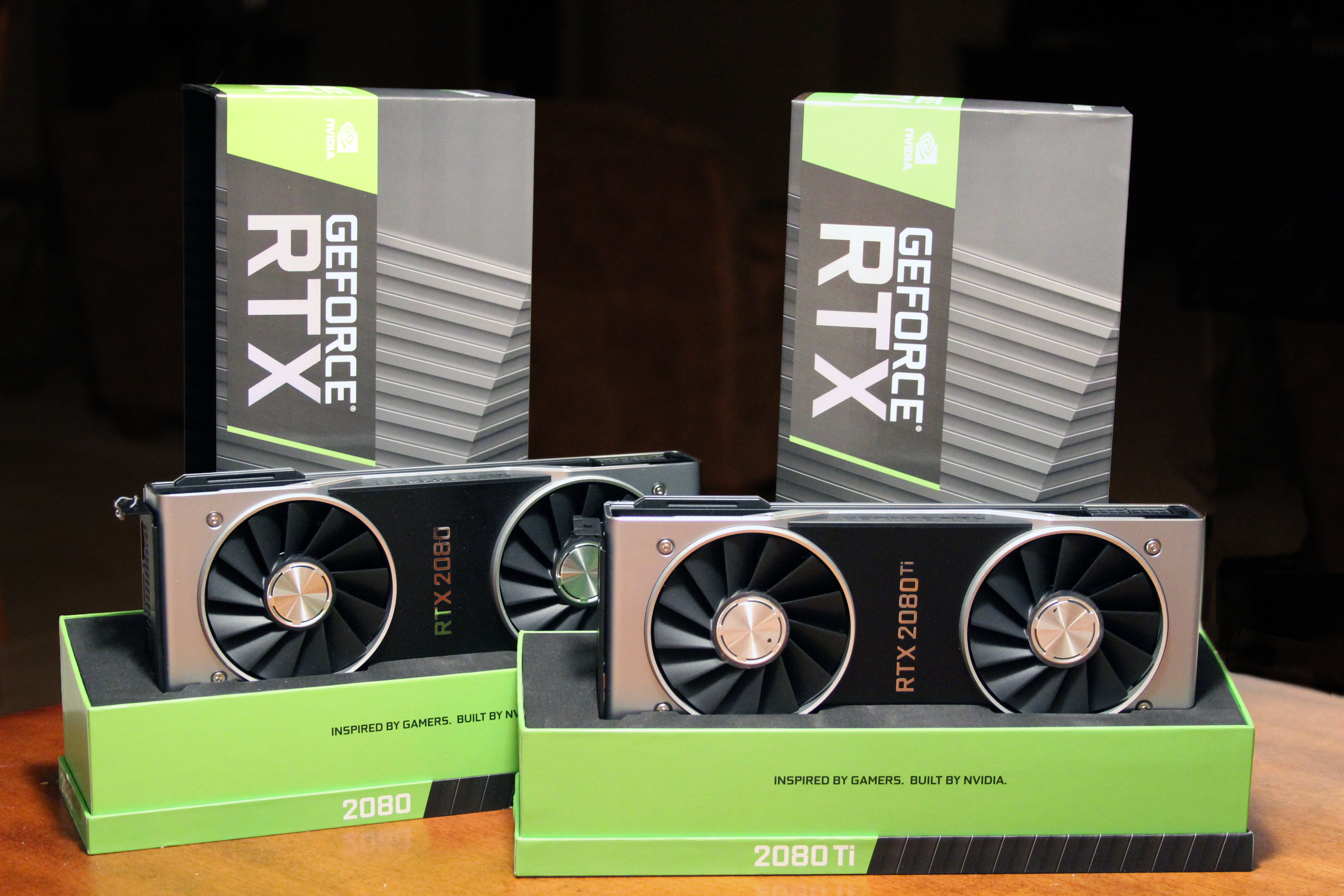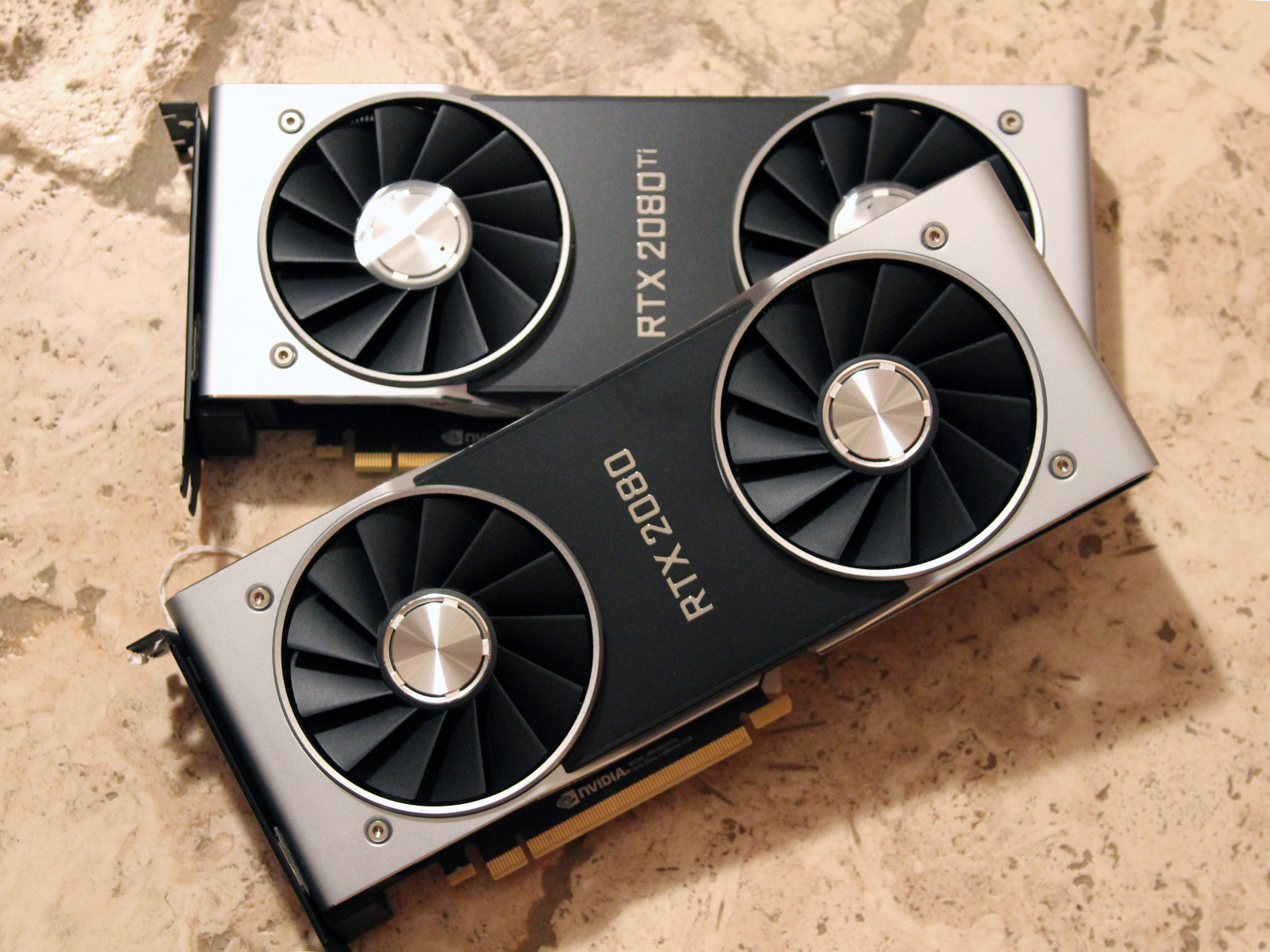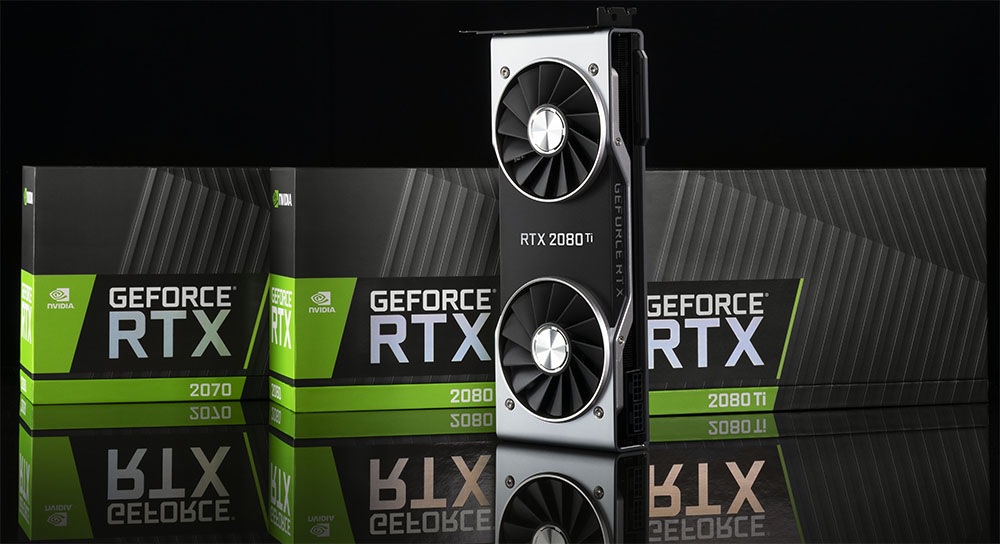GeForce RTX 2080 Ti vs. RTX 2080: Which Turing Card Is Right for You?
The GPU-price-hiking mining craze has subsided (at least for now) and enthusiast gamers with deep pockets finally have a pair of new cards to consider in the GeForce RTX 2080 Ti ($1,199 for the Founders Edition model) and the GeForce RTX 2080 ($799 for the Founders Edition version). So, provided that you can actually afford the 2080 Ti and are wondering, which RTX card is right for you? Let's take a look at the price and performance.
Prices are said to start at a more palatable $699 (2080) and $999 (2080 Ti) for non-Founders Edition cards, but it's tough to tell exactly where real-world pricing will land--especially here in the first few days and weeks after launch. At the time of this writing, the least-expensive RTX card we could find on Newegg was a $789 Windforce OC model, and the lowest preorder price we could track down for a 2080 Ti is is $1,179 for a Zotac model. So for now at least, third-party RTX cards seem to be sticking close to the higher price of Nvidia's own overclocked Founders Edition options.
There's also a lesser GeForce RTX 2070 on the way. But it's not slated to arrive until October, so we haven't had a chance to do any testing to see how it compares to its RTX siblings or previous-generation card options.
These new cards also have a number of features that set them apart from previous-generation parts, like RT cores for real-time hybrid ray tracing, as well as AI-focused Tensor cores for Deep Learning Super Sampling (DLSS). We've covered these and more in detail both in our Turing architecture deep dive, and our review of the GeForce RTX 2080 Ti.
Let's take a quick look at the specs of these new cards.
| Row 0 - Cell 0 | GeForce RTX 2080 Ti Founders Edition | GeForce RTX 2080 Founders Edition | GeForce RTX 2070 Founders Edition |
| Price | $1,199 | $799 | $599 |
| CUDA Cores | 4352 | 2944 | 2304 |
| Boost Clock | 1635MHz (OC) | 1800MHz (OC) | 1710MHz (OC) |
| Base Clock | 1350MHz | 1515MHz | 1410MHz |
| Memory | 11GB GDDR6 | 8GB GDDR6 | 8GB GDDR6 |
| USB Type-C and VirtualLink | Yes | Yes | Yes |
| Maximum Resolution | 7680x4320 | 7680x4320 | 7680x4320 |
| Connectors | DisplayPort, HDMI, USB Type-C | DisplayPort, HDMI, USB Type-C | - |
| Graphics Card Power | 260W | 225W | 225W |
For No-Compromise 4K Gaming, Go with the RTX 2080 Ti
There's no getting around the fact that both the RTX 2080 Ti and the RTX 2080 are very expensive. But if it's no-compromise high-end gaming you're after -- particularly if you have a 4K monitor or a high-refresh panel with a 2,560 x 1,440 resolution or better -- the high-end 2080 Ti model is the card for you. As we said in our review, "If you aspire to game at 4K and don’t want to choose between smooth frame rates and maxed-out graphics quality, GeForce RTX 2080 Ti is the card to own. There’s just no way around it." Another way to look at it: You don't want to spend $700 or more for an RTX 2080 and then be disappointed about performance.
If You're Primarily Interested in Ray Tracing You Might Want to Wait
Nvidia focused primarily on ray tracing when it announced the Turing architecture behind its new RTX cards, with CEO Jensen Huang Huang hyping its arrival as “the Holy Grail of our industry.” To be sure, the lighting effects and realistic reflections that the technology enables are striking. But at launch, there were no functioning ray tracing-enabled games, and a fairly short list of titles expected to support ray tracing in the near-term future. Even Battlefield V, the primary title that Nvidia used to show off this key feature, was pushed back until November.
Get Tom's Hardware's best news and in-depth reviews, straight to your inbox.
While we have no doubt that there will eventually be several AAA titles sporting impressive ray tracing features, the simple fact right now is that we have no real sense of exactly how demanding ray tracing will be and which card you'd need to achieve playable frame rates at a given resolution. You could of course buy an RTX 2080 Ti, secure in the notion that you'll get the best ray tracing experience possible with these current-generation cards. But if your monitor is stuck at, say, 1080p and you don't plan on upgrading anytime soon, you may be paying hundreds extra for more GPU muscle than you need. We should have a much better sense of ray tracing performance across at least a few titles as we get closer to the end of 2018. If you have a graphics card that can tide you over until then, it may pay to wait before clicking that RTX buy button.
The RTX 2080 Founders Edition Is a Good Fit for 1440p Gaming
As you can see in the charts below, the RTX 2080 doesn't lag that far behind its pricier Ti counterpart, despite costing $400 less. Given the big price difference, that makes the lesser card a much better deal in terms pixel pushing-per dollar. That's not exactly a surprise, as the graphics card that sits one step down from the flagship is often nearly as fast as the top-end card for a lot less money. But usually that discussion revolves around the **80 card model versus the **70 card. Really, though, it's the previous-generation GTX 1070 Ti and GTX 1070 that deliver the best value in terms of frame rates for your money. Nvidia's new cards sit just above the Titan cards in terms of performance per dollar. As we said before, there's no denying that these are expensive cards.
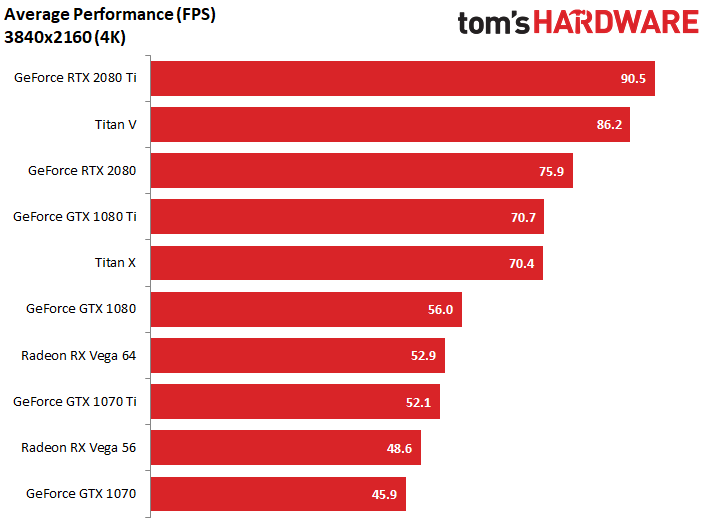
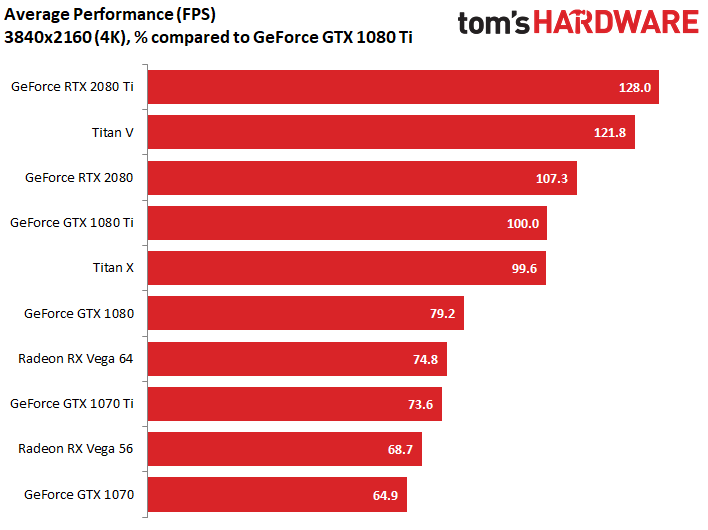
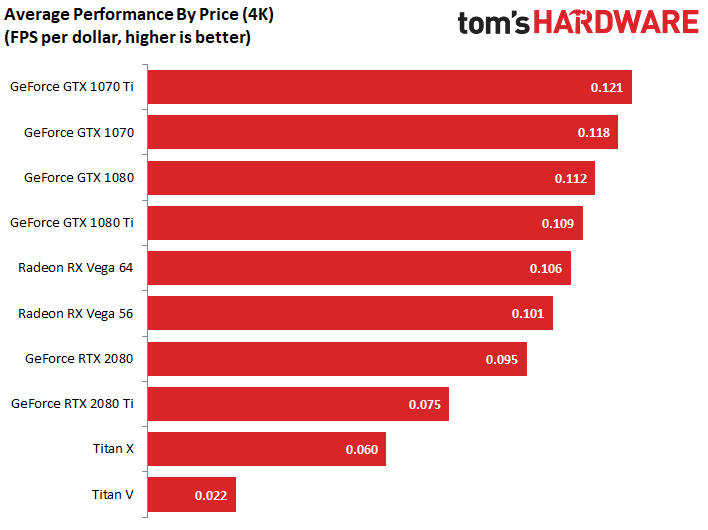
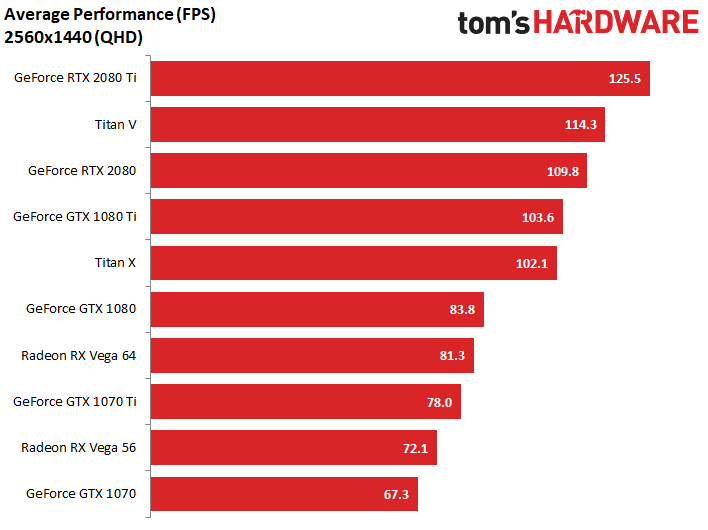
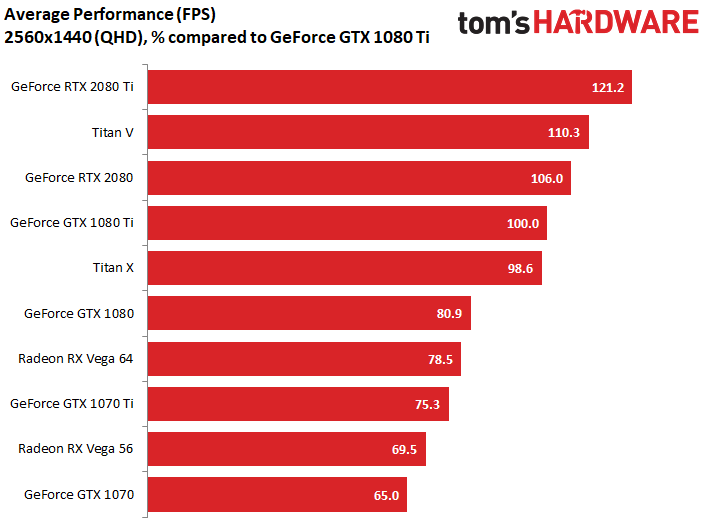
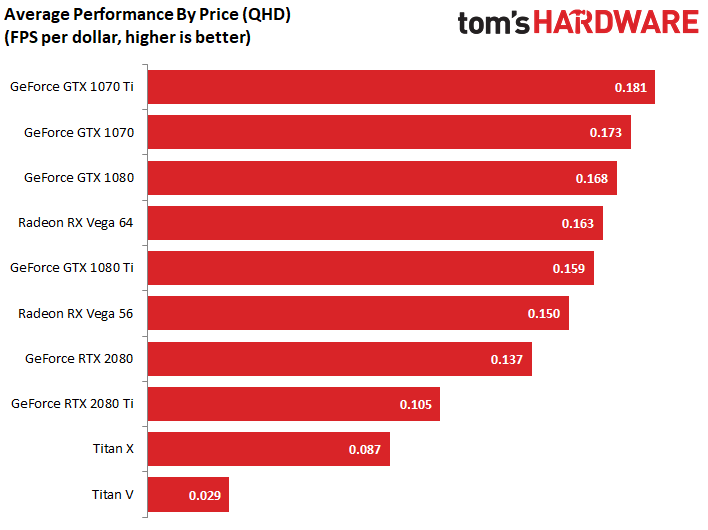
It's unusual for Nvidia to release its Ti variant at the same time as other high-end cards. But at least that means with the 2000-series cards that potential buyers can get a clear picture of high-end performance options in Nvidia's gaming lineup early on. Or rather, we will have that once we get a chance to test an RTX 2070.
In short, what does all that mean for buyers looking to pick up a new high-end card today? We would recommend the Ti variant for those who truly want no-compromise 4K gaming and are willing to spend $1,000 and up to get there. For everyone else, the RTX 2080 delivers most of the Ti's performance for a lot less money, and is a good fit for those with 1440p displays.
But as we mentioned in our 2080 review, the previous-generation GTX 1080 Ti, while it lacks new features like dedicated cores for ray tracing and AI, is nearly as powerful in current games, and readily available for less than $700--about $100 less than the least-expensive RTX 2080 when we wrote this. So if you're mostly interested in traditional gaming performance, rather than the promise of ray tracing and DLSS in future titles, the GTX 1080 Ti is clearly the better buy.
The RTX 2080 Ti May Be Sold Out When You Read This
In some sense, if you're reading this in the days surrounding initial availability of Nvidia's first RTX cards, the discussion about which card to buy may be a bit pointless. As we wrote this just after these cards launched, pre-orders of the 2080 Ti were sold out, both on Nvidia's site and popular sellers like Newegg, while some models (including the Founders Edition) of the stepped-down 2080 were still readily available. Of course, stock scarcity is nothing new for a big graphics card launch. And in-stock availability could change in the coming days. But if you're leaning toward the 2080 Ti for no-compromise 4K gaming, you may have to wait a bit.
Keep in mind that we're also still in the dark about how the RTX 2070 performs. So if you want to spend less money and/or you don't quite need as much performance as the RTX 2080 delivers, it's probably worth waiting a few weeks to find out.
After a rough start with the Mattel Aquarius as a child, Matt built his first PC in the late 1990s and ventured into mild PC modding in the early 2000s. He’s spent the last 15 years covering emerging technology for Smithsonian, Popular Science, and Consumer Reports, while testing components and PCs for Computer Shopper, PCMag and Digital Trends.
-
Jim90 "You could of course buy an RTX 2080 Ti, secure in the notion that you'll get the best ray tracing experience possible with these current-generation cards. But if your monitor is stuck at, say, 1080p and you don't plan on upgrading anytime soon, you may be paying hundreds extra for more GPU muscle than you need. "Reply
-->But...we already know that for RT functionality, you will be stuck at 1080p in order to achieve an acceptable frame rate. That is, unless the devs cut back (further?) on the card's potential for this (RT sales tick-box unfortunately still gets checked).
With what we do know already, I'm very sceptical about the level of RT capable of being delivered to the end user - not the card's potential when independent of fps. On the other hand, the 2080Ti does show a reasonable jump in performance, that is, until you look at the insane asking price; the card's full RT potential is no where ready for acceptable fps in this gen - and Nvidia damn well know this. -
logainofhades Given the price of the 1080ti, and the similar gaming performance, the 2080 is simply a bad buy. I don't see RT as being a big enough of a deal, yet, to warrant the extra cost.Reply -
hannibal And that was 2080ti model... so 720p for normal 2080 and 640*480 for 2070 model to run raytrasing games ;)Reply
Well They will tune down the raytrasing a lot... -
newsonline5000000 TWO GTX 1080 ti in SLI is ALOT better than RTX 2080 TiReply
and GTX 1080 Ti is better than RTX 2080
Until Nvidia lowers the RTX 2080 ti Price to ~$800 , and the RTX 2080 to ~$500 .. I am not buying. -
logainofhades Reply21339542 said:TWO GTX 1080 ti in SLI is ALOT better than RTX 2080 Ti
and GTX 1080 Ti is better than RTX 2080
Until Nvidia lowers the RTX 2080 ti Price to ~$800 , and the RTX 2080 to ~$500 .. I am not buying.
Unless a title has little to no SLI support. The 2080 is faster, but not by enough of a margin to justify the higher price tag. -
newsonline5000000 Reply21339574 said:21339542 said:TWO GTX 1080 ti in SLI is ALOT better than RTX 2080 Ti
and GTX 1080 Ti is better than RTX 2080
Until Nvidia lowers the RTX 2080 ti Price to ~$800 , and the RTX 2080 to ~$500 .. I am not buying.
Unless a title has little to no SLI support. The 2080 is faster, but not by enough of a margin to justify the higher price tag.
Tomshardware should test the RTX 2080 ti against 2x GTX 1080 ti SLI.
before other sites do this.
it is thee same price , 1080 ti cand be found for $650 two for $1300 ... almost th same price of RTX 2080 ti
Tomshardware should test the games in this review and compare -
Jim90 Reply21339600 said:
Tomshardware should test the RTX 2080 ti against 2x GTX 1080 ti SLI.
before other sites do this.
it is thee same price , 1080 ti cand be found for $650 two for $1300 ... almost th same price of RTX 2080 ti
Tomshardware should test the games in this review and compare
+1 -
Dantte I'm assuming by Tom's stamping its name on the charts you have a 2080 and 2080Ti in house for benchmarking and you OWN those numbers? If you do have one, why no in-depth bench with specific games, resolutions and settings?Reply
... or are they Nvidia's numbers you just threw into a chart and are going to scapegoat Nvidia if the product doesnt live up to the hype?
#JustBuyIt
If you havent noticed, alot of Tom's readers and myself are losing faith and trust in Tom's ability to write a truthful article with REAL data and test result. I'm sick of the manufacturer hype, political bias stories, and other trash this site has turned into lately... just the facts please.
